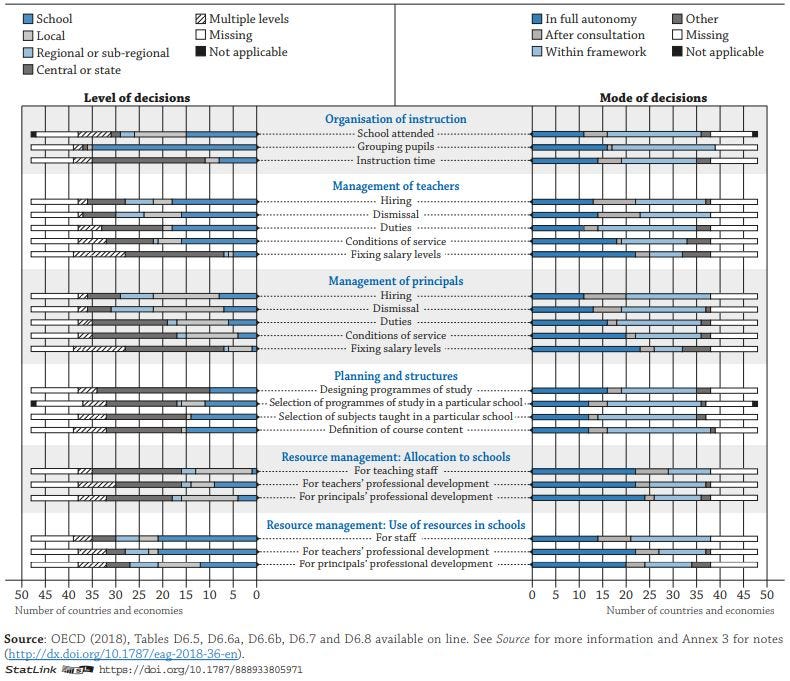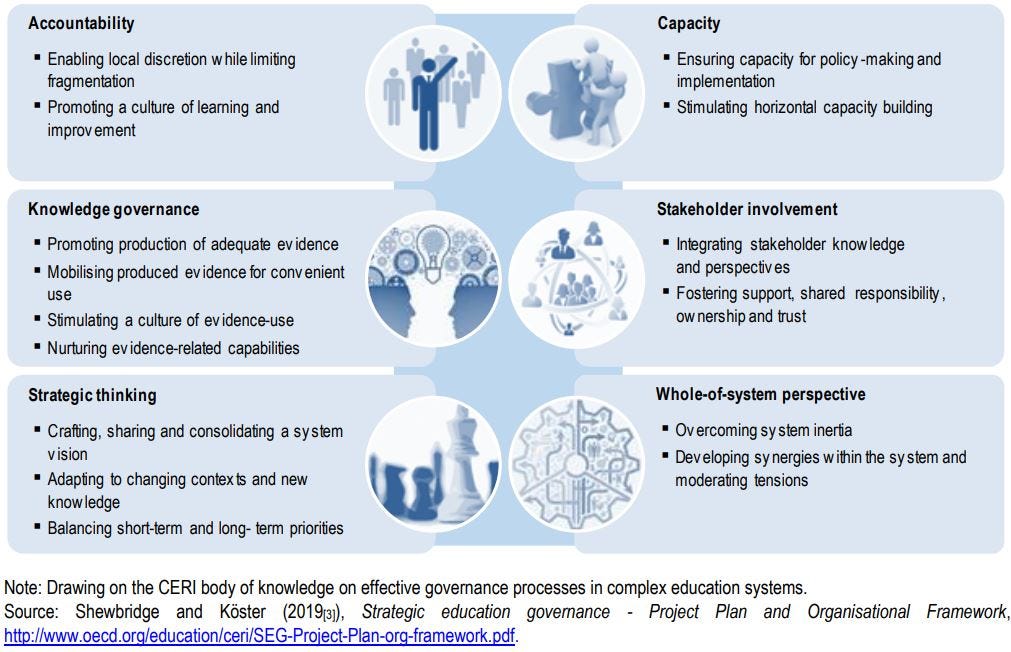Modern governance tools include knowledge governance, stakeholder involvement, accountability mechanisms, strategic thinking, policy design and implementation capacity, and promoting a whole-of-system perspective. Effective knowledge governance aims to get decision-makers to consider evidence systematically in their practice, both for education practitioners’ day-to-day decisions in a classroom setting and for education policymakers. This involves improving the provision of accessible and relevant evidence, and developing skills to use evidence, including through greater interaction between evidence users and producers.
Education organisation and governance
Modern education governance requires effective and efficient governance processes to achieve greater alignment among the multiple actors influencing educational decisions.

Key messages
The complexity of modern education systems requires inclusive and adaptable governance systems. With increasing numbers of stakeholders involved in designing, delivering and monitoring education, there’s a move in many systems to greater school autonomy alongside the use of central evaluation and assessment systems. These systems provide evidence to schools for decision-making and improvement, while also including accountability mechanisms to ensure basic compliance and provide information to families when choosing schools. Effective and efficient governance processes are important in achieving greater alignment between different layers of educational authorities (central, regional, local), schools, teachers (through professional organisations and unions) and parents (through informal and formal channels such as parent associations), who all influence education policy and the delivery of services.
Generally, central authorities are responsible for overall planning in areas such as laws and regulations, resource allocation, qualifications framework, accreditation requirements and the use of national examinations or assessments. Meanwhile, local authorities and schools commonly share decisions about the hiring and firing of staff, salary schedules, and work conditions – although these vary from country to country. Schools primarily retain decision-making authority concerning the organisation and delivery of instruction, such as the choice of textbooks, teaching methods and assessment of students’ progress.
Context
Responsibilities for key education decisions in education systems
There are four general domains of decision making in education systems: organisation of instruction, personnel management, planning and structures and resource management. There are large differences in the levels of government responsible for decisions across these four domains.
Decisions taken at each level of government and mode of decision making in public lower secondary education, by type of decision (2017)

Effective governance processes in education systems
The complexity of modern education systems necessitates a governance approach that promotes strategic thinking and coherence among different aspects of the system. The approach must also draw on accountability and knowledge governance as key mechanisms and ensure key decision makers have the neccessary capabilities and competence.
Domains of strategic education governance

Related data
Related publications
Programmes and projects
-
The OECD Indicators of Education Systems (INES) programme seeks to gauge the performance of national education systems through internationally comparable data.Learn more
-
PISA is the OECD's Programme for International Student Assessment. PISA measures 15-year-olds’ ability to use their reading, mathematics and science knowledge and skills to meet real-life challenges.Learn more
-
The Centre for Educational Research and Innovation (CERI) provides and promotes international comparative research, innovation and key indicators, explores forward-looking and innovative approaches to education and learning, and facilitates bridges between educational research, innovation and policy development.Learn more
-
The OECD’s programme on education and skills policy support policymakers in their efforts to achieve high-quality lifelong learning, which in turn contributes to personal development, sustainable economic growth, and social cohesion.Learn more
-
The Higher Education Policy Programme carries out analysis on a wide range of higher education systems and policiesLearn more
-
Since 2013, the OECD has gathered evidence on how school resource policies work in different contexts. The focus is now on digital resources to enable countries to learn from each other in the digital transformation of their education.Learn more
-
Across the OECD, enormous investment and effort has aimed to reinforce the quality, production and use of education research in policy and practice. Despite this, strengthening the impact of research in education policy making and practice remains a challenge for many systems.Learn more
-
TALIS - the Teaching and Learning International Survey - is the world's largest international survey about teachers and school leaders.Learn more







